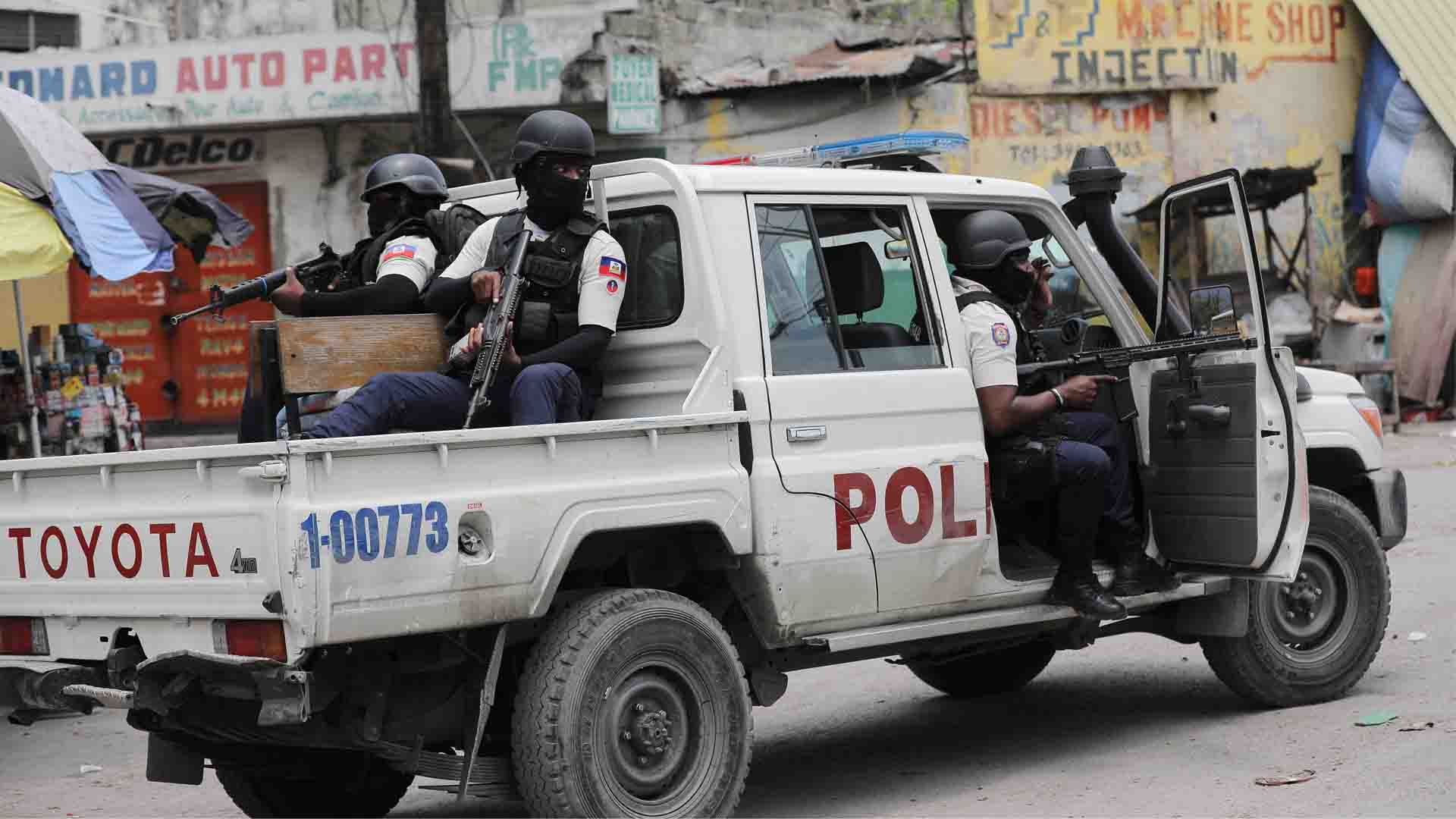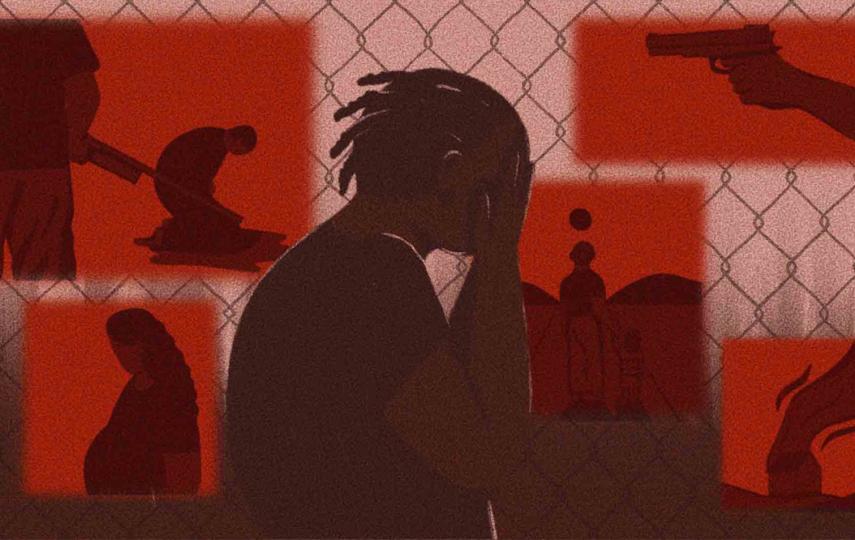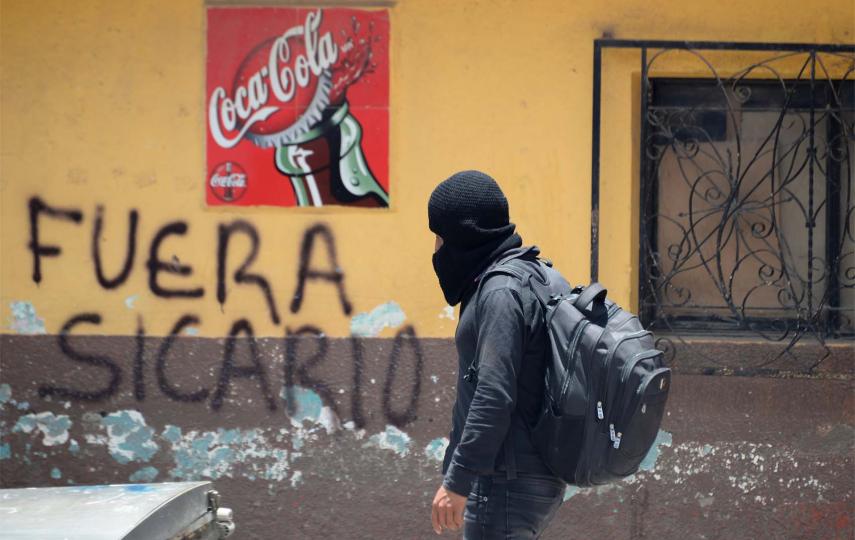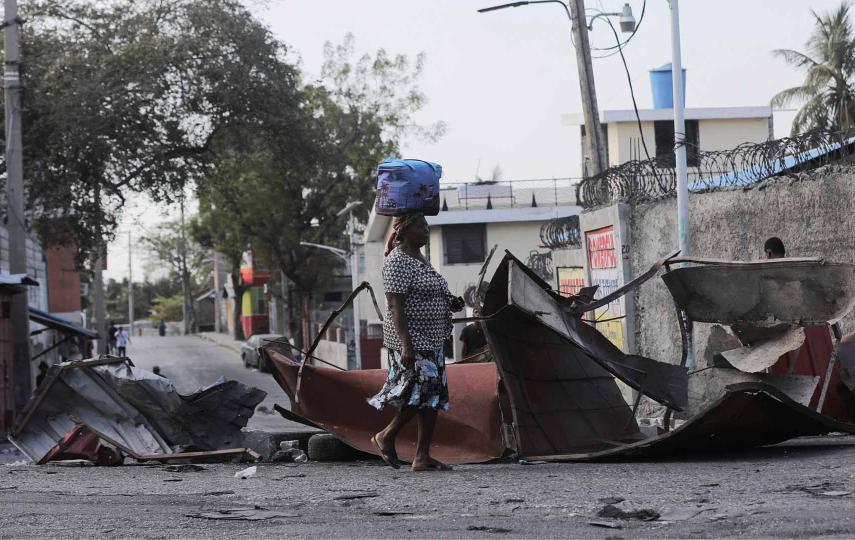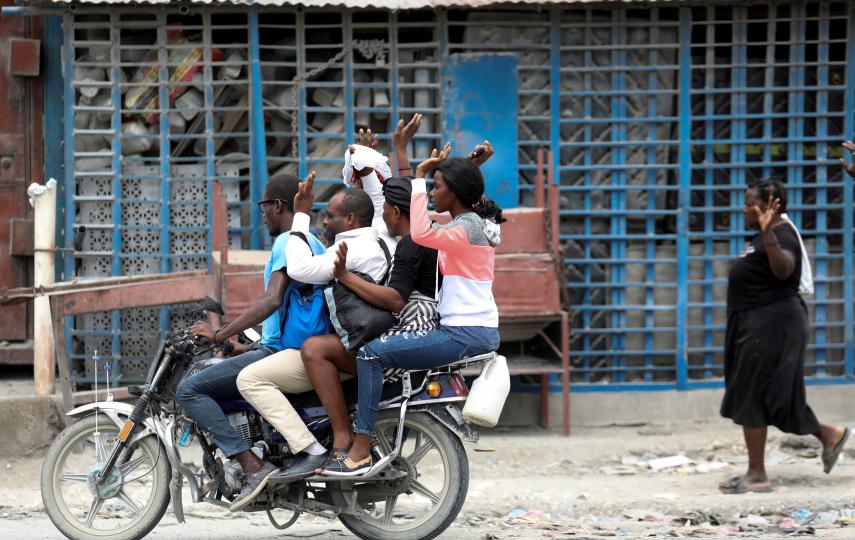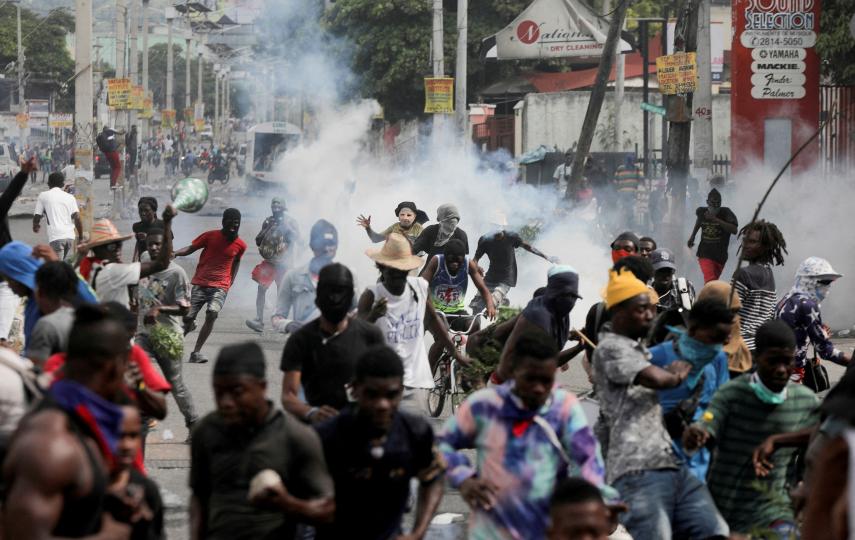International support for better policing, more government accountability, and a crackdown on weapons being smuggled to gangs from the United States and other countries: Those are some of the steps that can be taken right now to start tackling Haiti’s crisis, according to the UN’s Independent Expert on Human Rights in Haiti, William O’Neill.
O’Neill was one of several top UN officials to visit the country last month, including Secretary-General António Guterres. In the wake of the visits, support for an armed international force to intervene in Haiti seems to be gaining traction for the first time since Haiti’s acting Prime Minister Ariel Henry called for outside help to combat insecurity last October.
But outside intervention alone will not solve Haiti’s problems, according to O’Neill. Haitian government officials also need to step up. “Many state officials don´t do their jobs. There is no accountability; there is no oversight; there are no consequences,” he said in an interview with The New Humanitarian last week.
“There are things that are not hugely expensive, and not technically complicated, that could be done right now,” he added. “[But] you have to have the commitment, the political will, and a sense of urgency. I just don't see the spark to really take it on.”
At the international level, on 14 July, the UN Security Council extended the mandate of the United Nations Integrated Office in Haiti (BINUH) – tasked with supporting political stability, the reduction of violence, and the promotion of human rights – and added 70 police and corrections advisers to scale up support for the Haitian National Police.
The Security Council also gave Guterres 30 days to write a report containing options to combat gangs in the Caribbean country. Initially opposed to any kind of foreign intervention, the Caribbean Community (CARICOM) recently changed its position and said it would back a Security Council approved force.
Gangs have taken increasing control of Haiti’s capital Port-au-Prince since the killing of President Jovenel Moïse in 2021, leading to widespread kidnappings, rapes, gender-based violence, and killings. National institutions have stopped functioning, many schools, police stations, courts, and health centres have closed, and violence is hindering humanitarian aid efforts.
Gang blockades and extortion make it almost impossible to send supplies across a country stricken by acute hunger and an outbreak of cholera. Earlier this month, Médecins Sans Frontières had to close one of its hospitals after 20 gang members violently entered and removed an injured patient from surgery.
O’Neill – an international lawyer specialised in humanitarian, human rights, and refugee law – has worked extensively in and on Haiti for decades and helped establish the Haitian National Police in 1995.
In his conversation with The New Humanitarian, he spoke about what kind of international force is needed in Haiti, highlighted positive steps being taken by Haitian officials and civil society at the local level, explained why he thinks the situation in the country is not yet “hopeless”, and called for a greater sense of urgency from the Haitian government and the international community.
“It's getting worse each day, and as time goes on, it just becomes harder to fix these problems; they get more and more entrenched,” he said. “The 30-day report is a step in the right direction… Time is of the essence, so a quick turnaround on this is vital.“
The following interview has been edited for length and clarity.
The New Humanitarian: So far, no country has been willing to lead an international force to intervene in Haiti. Are you confident that the renewed pressure from the UN will change this?
William O’Neill: I hope so. There has been momentum building the last few weeks. Understandably, some member states wanted to have more specificity about what they would be committing to. My own view is that we’re not talking about a huge peacekeeping presence [like the United Nations Stabilisation Mission in Haiti, which operated from 2004 to 2017]. That's not really needed.
What is needed is some specialised, experienced people from the policing world – not the military – that have dealt with armed groups, with gangs, with arms and drug trafficking, with illegal financial transfers and money laundering, and with intelligence. That would be absolutely vital to help the Haitian National Police, who admit they don’t have the skills or resources to address those issues; not replacing them, but supporting them, working alongside them, and really helping them plan operations is enough.
We’re not talking about thousands of people. I think many gangs are not interested in resisting a force that includes professional and skilled people. They would be much more interested in negotiating with someone at that point.
I heard during my visit that the gangs are getting increasingly tired and that the stress of making a payroll and keeping their troops in line was taking a toll. This week, some key gangs signed a truce, committing to try to end violence and achieve peace and security.
But one of the main reasons gangs are so powerful in the first place is the easy access they have to heavy weapons and ammunition. If you remove their fire power, they would be extremely weakened. The United States, the Dominican Republic, and Jamaica – the main sources of weapons going to Haiti – need to take a much more robust approach to stop the flow of weapons. A universal embargo by the UN that would apply to every member state would also be symbolically important.
The New Humanitarian: You said that the situation is not “hopeless”. What can be done?
O’Neill: If there are people of integrity, who are competent and serious about doing their job, then you have won more than half the battle. In Haiti, the problem has often been that many state officials don’t do their jobs. There is no accountability; there is no oversight; there are no consequences.
As a result, basic services – including basic rights, such as justice, healthcare, and food – are not being provided to the population. No one ever pays a consequence for that. We talk about impunity for massacres or assassination, but there is also impunity for government officials who get away with doing nothing.
Despite the insecurity and not having enough resources, the Haitian state could be doing much more to help protect human rights. But I found examples of some state officials who are trying to do the right thing, the right way, against great odds. Civil society, human rights organisations, women's groups, journalists’ associations, and bar associations are also really fighting to improve the situation.
I met a police director in Cap-Haïtien, in the north of the country, who goes out all the time and meets with civil society groups and human rights groups. His policemen are out on patrol. They’re at main intersections or at the airport. They’re talking to people and showing them that they are there to protect and serve. That gives people confidence in the police, and then people give the police intelligence about where the gangs are. As a result, in Cap-Haïtien there is virtually no gang problem.
The new prosecutor of Port-au-Prince, who started a month ago, has also already done more than his five predecessors put together. It's not that complicated, it doesn't cost a lot of money, and it doesn’t require years of training. It's really just people doing their jobs and getting punished if they don’t.
The New Humanitarian: What strategies do you recommend to help address Haiti's most pressing issues?
O’Neill: The contrast between Cap-Haïtien, the second biggest city, and Port-au-Prince is astonishing. Cap-Haïtien is functioning. It’s like Haiti in the old days: it’s much calmer; people are much more relaxed; there are lots of schools and businesses; places are open late at night; there are tourists; hotels are working.
Instead of focusing on Port-au-Prince, people should be focusing much more on the rest of the country. Those areas are not so dominated by gangs, things pretty much work, and you can have functioning education, healthcare, and clean water programmes.
The problem is that getting goods and shipments to those parts of the country is a challenge for the humanitarian agencies because everything still has to come through Port-au-Prince. Customs take forever, and I heard allegations that they are charging humanitarian agencies the same tax level charged to private companies. Then you have to get the goods out of there, which means getting past gang checkpoints, having to pay them more taxes, or they don’t get through at all because the gangs steal them.
There should be a major push to develop the ports and airports in Cap-Haïtien, and other parts of the country where you can deliver humanitarian and other goods, bypassing the gangs. The situation isn't great in the rural areas, but it is much better than in Port-au-Prince. It could also be a way to show people in Port-au-Prince that life outside is much better, and since many are not originally from the city, they might think about going back to their region.
The New Humanitarian: What is being done to address the needs of the more than 165,000 people internally displaced in Haiti?
O’Neill: Internal displacement is vastly undercounted, just like sexual abuse cases. The issues are linked because displaced women are particularly vulnerable to sexual abuse. Displacement is a big problem that doesn't get enough attention. It's only going to get worse if the violence continues and the lack of access to food and healthcare is not resolved.
The Haitian government should be much more open and frank about this issue. They have been very reluctant to allow humanitarian agencies to establish proper reception centres for displaced people. I think they are afraid of the image of camps. But governments have obligations, and what exists now is completely inadequate and violates all kinds of humanitarian and human rights principles.
The New Humanitarian: What did acting Prime Minister Ariel Henry and other senior government figures say about the situation in the country when you met with them?
O’Neill: They say they have huge challenges, which is true; they say the gangs and security are a problem, which is true; they say they lack resources, which is partly true. So I’m just trying to figure out how we can encourage them to be more proactive.
I didn't get the sense of urgency that there is a real crisis. This is a house on fire, there are things that we can do right now, and we need to keep pushing so they get done. There are things that are not hugely expensive and not technically complicated that could be done right now. But you have to have the commitment, the political will, and a sense of urgency. I just don't see the spark to really take it on.
The New Humanitarian: Do you think there will be an international force for Haiti anytime soon?
O’Neill: I hate to predict this kind of thing. It depends what you mean by soon. I wish, I hope, but I have my doubts. With Russia, China, and Ukraine getting mixed up into Haiti, it makes it much more complicated to do something, and that's really too bad.

